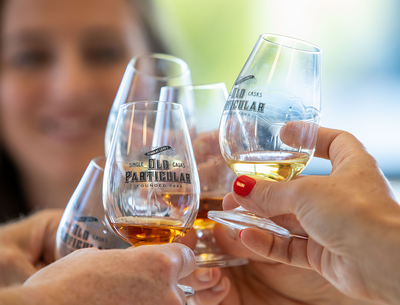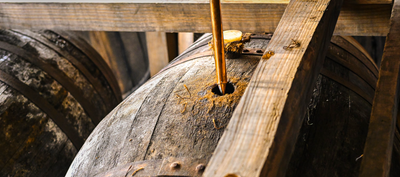Our Fellow Tobi Piwek from Germany loves writing about whisky almost as much as he loves drinking it. On his blog BarleyMania he recently did an interview with our very own Cara, talking with her about the philosophy, positioning and future plans of Strathearn Distillery, which we acquired in late 2019. At one point, the unit’s Head of Production Zak Shenfield also chimed in and gave some first-hand insights into the making of our premium Highland Single Malt. Enjoy the read – preferably with a glass of Strathearn in your hand.

WE IMMEDIATELY FELL IN LOVE WITH THE SET-UP AND THE VERY HANDS-ON APPROACH TO PRODUCING GREAT QUALITY WHISKY
Tobi: Strathearn Distillery began production in 2013. Six years later, the micro distillery got acquired by Douglas Laing. When did you start looking at the wee Highlands unit as a potential addition to your business? And why?
Cara: We actually first visited Strathearn back in late 2013, early 2014. We immediately fell in love with the set-up and the very hands-on approach to producing great quality whisky – it was very much in line with the Douglas Laing style and philosophy. Timing wasn’t right for us, however. It was through 2019 that we felt we would like to finally add Strathearn to the Douglas Laing family and thereafter the process began. We want Strathearn to have a pretty unique positioning within our portfolio and the greater whisky world as an excellent, small batch Highland single malt with quality and a great wood policy at its core.
Tobi: More than a year before you bought Strathearn Distillery, you announced that you would build your own production site, Clutha Distillery, in Glasgow. How is this project coming along? And will the completion of Clutha Distillery have any impact on Strathearn Distillery’s role and position within the Douglas Laing cosmos?
Cara: Clutha is progressing well – slowly but well (!) – we are actually just finalising the stills. The building industry is SLOW – far slower than even the whisky world. So it’s taken longer than we would have liked, but we are making good progress (even with COVID-19, things are moving along positively and at pace). Strathearn’s positioning will remain as a premium Highland single malt whilst Clutha will be a robust, “chunky”, urban Lowland single malt with a pretty heavy sherry cask maturation policy.
Tobi: Strathearn has been with Douglas Laing for round about half a year now. Have there been any major changes to the distillery during that time, e.g. in regard to personel, production, orientation or presentation?
Cara: We inherited bottled stock which is of excellent quality (the distillery has always had a great wood and cask policy) and looks really good (in terms of packaging), so we are selling that through. But we are also excited at the prospect of being able to release our very own batch of Strathearn single malt. We were also very fortunate to inherit a great and very passionate team of people at the distillery. So really the only thing left for us to do (at this stage anyway) was invest in machinery, which is exactly what we are doing. We are currently installing new equipment that will allow us to increase the annual volume to just shy of 200,000 litres of alcohol. Would we want to produce more? Probably not – we’ll focus very much on quality over quantity with Strathearn.
Tobi: Recently, you bottled Batch 001 of Strathearn Single Malt Scotch Whisky – a young dram that’s matured way beyond its actual age! Can you tell us more about how this beautifully sherried whisky came to be (the indegredients, the craft, the casks, the magic, etc.) and how the whisky world reacted to it?
Cara: We believe Batch 001 is an amazing representation of how unimportant age can be in whisky terms, but how significant good wood is! It’s a beautiful big, bold spirit.
Zak: Our fermentation is very long at 4.5 days (approx. 108 hours), the industry standard being around 58 hours. Having this longer fermentation gives the yeast a chance to absorb some of the off-flavours created in fermentation. And it allows the yeast to settle below the up stand in the fermenter after fermentation has been completed. We do not transfer the yeast into the wash still as it is full of unwanted flavour. So the yeast is left behind and discarded.
Maturation of Batch 001 took place in virgin European oak and 1st fill oloroso sherry casks. We used smaller casks than the industry norm as they give more in terms of impactful flavour and colour in a shorter period of time. Virgin European oak is fairly unusual in the Scotch industry. It gives a tanic red berry quality to the whisky as well as a large amount of oak. The sherry wood is used to add balance with a bit of sweetness, and also to further support the red berry dynamic.
BM: I know I said I would ask you five questions max. But I gotta add a sixth one: Is there a chance you’d already give us a wee teaser of the next plans you have for Strathearn Distillery?
CL: We are in the process of creating a VIP tasting room called “the Strathearn Snug” at the distillery just now. Rather than being widely open to the public as per a visitor centre, we’ll keep it as being exclusively available to our closest friends … we hope to see you there soon, Tobi. ;)




